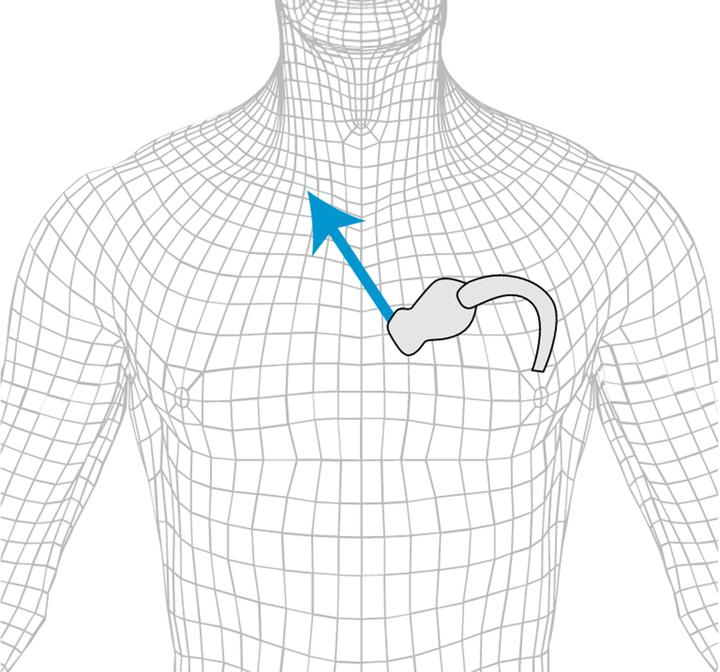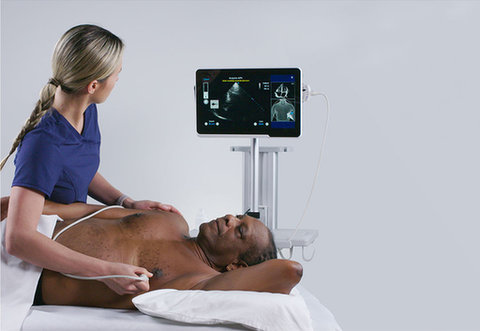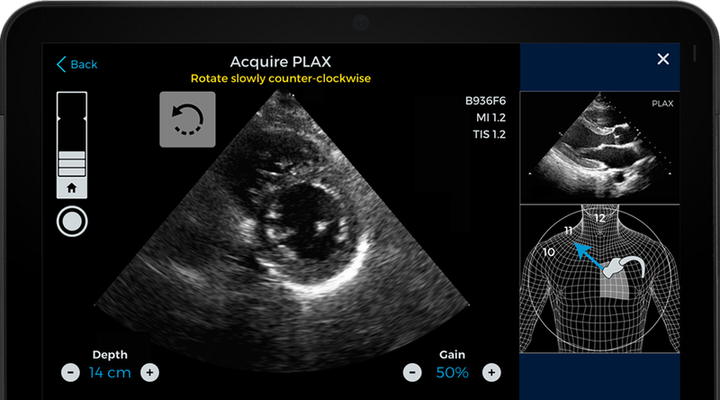Bringing Specialty Diagnostics to the
Point-of-Care
Caption Health
Caption Health is solving the problem of making heart sonograms easier to obtain.
By Michelle Thoeny

Across the medical field, democratization of ultrasound is being touted as the future of healthcare due to portable form factors and increasing hardware affordability. Ultrasound is a safe, non-invasive, and powerful diagnostic tool, and its benefits to patients have been demonstrated in a variety of clinical settings, from the emergency department to the operating room.
One of the largest barriers to ultrasound adoption is the ability to acquire diagnostic quality images quickly. Performing ultrasound is a complex skill which typically requires years of training to master. Without training, it remains extremely difficult to obtain a clinically-relevant ultrasound image, especially of moving objects like the heart. California-based Caption Health is tackling this challenge head-on.
Caption Health enables healthcare providers—even those without prior ultrasound experience—to capture diagnostic-quality images. The company’s flagship product—Caption AI, includes both Caption Guidance and Caption Interpretation features. Caption Guidance leverages the power of deep learning to tell clinicians on how to manipulate the transducer and where to place the ultrasound probe for each view to obtain the correct image and acquireshe image automatically when the placement is right, capturing a diagnostic quality image. In a sense, the FDA- authorized Caption Guidance software emulates the guidance that an expert sonographer would provide to optimize the image. CEO Andy Page thinks of Caption Guidancetechnology as a “co-pilot” that can assist doctors who have trouble getting particular scans, as well as those who have not used ultrasound much before.
Last year, a multi-center clinical trial was conducted by Northwestern Medicine and Minneapolis Heart Institute at Allina Health. As part of the study, eight registered nurses with no prior ultrasound experience used Caption Guidance to acquire ten different types of images on 240 patients, following a short training programme. A panel of five expert cardiologists assessed all the images taken by the nurses and found that they were of adequate quality to assess left ventricular size and function in 98.8% (237 out of 240) of the cases and images to assess the right ventricular size, which is harder to assess, were of sufficient quality in 92.5% (222 out of 240) cases.
“Deep learning will have a profound impact on cardiac imaging in the future, and the ability to simplify acquisition will be a tremendous advance to bring echocardiograms to the point-of-care in primary care offices,” notes Dr. Patrick McCarthy, the executive director of the Northwestern Medicine Bluhm Cardiovascular Institute and Vice President of Northwestern Medical Group
Capture: Real-time AI Guidance

We want to make ultrasound as useful as the stethoscope.
Caption Health also has FDA clearance for Caption Interpretation - including algorithms that automatically review all the relevant digital video clips from a patient’s echocardiography study, rate them according to image quality, and select the best ones to calculate Ejection Fraction—the single most widely used metric of measuring cardiac function. Caption Interpretation will be bundled with Caption Guidance, integrated onto a compatible ultrasound device, and offered to the market as Caption AI, to enable an immediate and fully automated estimate of ejection fraction to enhance decision making during point of care exams. Additionally, Caption Interpretation can be integrated into any DICOM PACS medical imaging environment to provide cardiologists with results as a seamless part of routine diagnostic workflow.
For each patient study, the Caption Interpretation software can automatically select optimal apical four chamber and apical two chamber digital video clips and can use them to perform an EF calculation. These calculations were compared to the standard Simpson’s biplane method. Literature shows that the average variability of cardiologist readers using the Simpson’s biplane method in estimating EF is 9.2%. The observed variability of Caption Guidance was superior at 8.29% (p = 0.002). Additionally, results from a study evaluating the effectiveness of Caption Interpretation were presented at the ASE Scientific Sessions, and concluded that the fully automated ejection fraction algorithm was accurate, performing well on patients across a range of body-mass index (BMI) and EF, including obese patients and on patients with a range of normal and abnormal EF.
Intelligent Interpretation
Caption Health was founded in 2013 Charles Cadieu, President and Kilian Koepsell, CTO. An entrepreneur and neuroscientist at heart, Cadieu spent his early adult life moving between the Massachusetts Institute of Technology, from which he has a master’s degree in engineering, and the University of California, Berkeley, where he received a PhD in neuroscience. It was during this phase that he grew interested in AI. “Back in the early 2000s, I had no idea that AI would become so big. But I was privileged to be part of groups at MIT and Berkeley that were working on developing better neural networks by taking inspiration from the human brain,” says Cadieu.
At Berkeley Cadieu met Kilian Koepsell. The duo shared an interest in deep learning and wound up on the founding team at IQ Engines, a company that was involved in using deep learning to identify images. After it was sold to Yahoo, the pair started working on the idea that deep learning was ready to be applied to medicine and co-founded Caption Health (previously known as Bay Labs) that sought to leverage the power of AI and cardiac imaging to deliver precise diagnosis and improved management of cardio-vascular diseases. “I was always inspired by applying science to medicine,” says Koepsell, who grew up in a family of doctors.
The Caption Health team strongly believes empowering more clinicians with ultrasound image acquisition capability will bring the benefits of ultrasound to more patients, help standardize the quality of care, and help institutions realize valuable cost and time savings. Caption Health’s breakthrough technology coupled with robust clinical validation can unlock the potential of point-of-care diagnostics by not only bringing the power of ultrasound to hands of general practitioners but expedite time to diagnosis, reduce the need for more costly testing, and decrease complications from invasive procedures. "No patient should have to forgo a potentially life-saving cardiac ultrasound. Through the power of artificial intelligence, Caption AI will provide patients with unprecedented access to ultrasound when and where they need it most," says Page, “Ultrasound is non-invasive, and we want to make it as useful as the stethoscope.”
Deep Learning curve
Ultrasound as the new stethoscope



No patient should have to forgo a potentially life-saving cardiac ultrasound. Through the power of artificial intelligence, Caption AI will provide patients with unprecedented access to ultrasound when and where they need it most.
Andy Page, CEO Caption Health